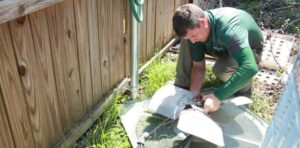Hello to our neighbors here in Fort Worth! We know that summer here in the Lone Star State can be absolutely oppressive. When it’s sweltering outside we trust our air conditioners to keep us cool, comfortable and offer some respite from the soaring temperatures beyond. Just like when you get a workout, an air conditioner can build up a sweat when it’s doing its thing, and that water needs somewhere to go… hence the AC drain line. But if your drain line is clogged your unit’s going to shut down – and nobody needs that in the middle of summer. Don’t worry, we’ve got your back. In this blog we’re going to take a look at how a drain line gets clogged and, most importantly, show you some ways you can prevent it from happening in the first place. So sit back, relax, sip some tea, and read on!
First, Let’s Take A Look At The Culprits
Before we look at ways to keep your drain from getting clogged, it’s important to know how the clogs happen in the first place. As we said above, moisture accumulates in your system while it works, especially when it’s working extra hard during all this heat. That moisture should be going out through the drain line but there are several ways this process can go awry.
Dust & Debris
Dust, pollen and other airborne particles get pulled into your AC system while it runs. When they mix up with moisture in your drain line, they can create a sludge that clogs things up.
Mold & Algae
The moisture in your drain lines makes a perfect environment for the growth of mold and algae, particularly when it’s really humid outside. The more these invaders multiply the more likely they create a blockage.
Storms & Flooding
If you’ve got heavy rain or flooding in your area, it can not only fill your drain line up to overflowing, but it can also carry other things like leaves, grass clippings or any other yard debris into your drain line, creating a blockage.
Now, How Can You Stop Them?
So those are some of the normal troublemakers – although that is by no means a comprehensive list. Basically, you want to do everything you can to prevent anything from getting into your AC drain line that isn’t supposed to be there. And here are some ways that you can do that.
Clean Your Air Filters
You may not think that air filters have anything to do with your AC drain line, but as we said above, dust and dirt that’s in your air goes through your air conditioning system and if it’s not caught by the filters will likely end up in the drain line. Your filters are the first line of defense not only for your indoor air quality but for keeping your drain line clear.
Flush The Drain Line
Some everyday household items can help keep your drain line clean. You can use vinegar, hydrogen peroxide, bleach, or even just hot water to flush out your line. One safety tip – don’t ever use vinegar and bleach at the same time, as the mixture will generate potentially deadly chlorine gas.
Keep Your Humidity Under Control
Ironically, though it’s your drain line’s job to carry moisture, moisture is also its greatest enemy. Moisture creates the right conditions for mold and algae growth or mixes with dirt and other pollutants to clog things up. This can be exacerbated if you have high humidity levels in your home, so make sure that your home is properly insulated and use a dehumidifier if your levels are still too high.
Get Professional Maintenance
So you love watching YouTube videos that help you find DIY solutions to problems in your home. That’s great! But never underestimate the power of having a professional tune-up done on your AC system. Our technicians here at Comfort Experts can spot potential issues and correct them before they result in damaging blockages.
Let Us Take Care Of Things For You
Look, we understand. Your life is busy, and checking over your air conditioning system isn’t always going to be at the top of your priority list. But a little prevention can go a long way. A clogged AC drain can cause water damage or even mold growth inside your home – and nobody wants that. So if you think that you’ve got a drain clog, or there are conditions in your home that make one likely, give us a call here at Comfort Experts. Our pros are here to help sort things out and make sure that you can enjoy worry-free cooling all summer long. Message us online or call us at (817) 341-5149. Remember, a well-maintained AC is a happy AC, and a happy AC means a happy home for you and your family.
 MERV stands for Minimum Efficiency Reporting Value and is a scale that is used to measure an air filter’s filtration system. The ASHRAE, or American Society of Heating, Refrigeration, and Air Conditioning Engineers assign MERV ratings to air filters from 1 to 16 with 1 being at the low end of air filtration and 16 at the high end.
MERV stands for Minimum Efficiency Reporting Value and is a scale that is used to measure an air filter’s filtration system. The ASHRAE, or American Society of Heating, Refrigeration, and Air Conditioning Engineers assign MERV ratings to air filters from 1 to 16 with 1 being at the low end of air filtration and 16 at the high end. How Do These Systems Work?
How Do These Systems Work? Whistling Noises
Whistling Noises Wear and Tear on an AC Unit
Wear and Tear on an AC Unit
